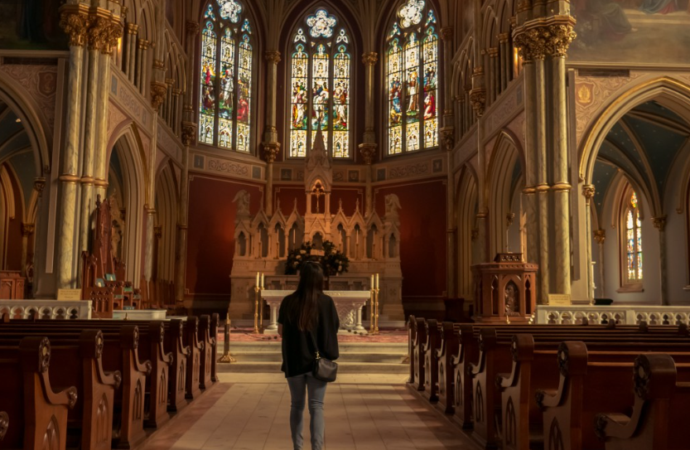It’s not news to report that Christianity in America has been in alarming decline for many years – even more dramatically so in Europe, a realm which once was known as Christendom. But a new Pew Research Center poll offers a heartening glimmer of hope and change.
The decline of Christian America is indicative of what pastor and political scientist Ryan Burge said “may be the biggest cultural shift in our lifetimes”: the exodus of Generation Z (those born between 1997 and 2012) out of religion. Nearly half of them (44.4%) identify as atheist, agnostic, or belonging to no religion in particular. That makes them the least religious generation in U.S. history.
But Pew just released its Religious Landscape Study (RLS) for 2023-2024 (this is the third such study conducted by Pew – the first in 2007, the second in 2014). The most recent RLS finds that the decline of our Christian population has paused, and the numbers have become relatively stable since 2019. Similarly, the religiously unaffiliated population, after rising rapidly for decades, has leveled off as well. Currently, statistics show:
- 62% of U.S. adults describe themselves as Christians (40% Protestant, 19% Catholic, and 3% other Christians). That is a 16-point drop from the first poll only 17 years ago;
- 29% are religiously unaffiliated (5% atheist, 6% agnostic, and 19% who identify religiously as “nothing in particular”) – a 13-point rise from 2007;
- 7% belong to religions other than Christianity (2% Jewish and approximately 1% each Muslim, Buddhist, and Hindu).
Key measures of religious belief and practice seem to have held fairly steady in recent years too:
- 44% of U.S. adults say they pray at least once daily. Though down significantly from 2007, this measure has held between 44% and 46% since 2021;
- 33% say they go to religious services at least once a month. This number has hovered consistently in the low 30s since 2020.
And large majorities of Americans still have a spiritual or supernatural outlook:
- 86% believe people have a soul or spirit in addition to their physical body;
- 83% believe in God or a universal spirit;
- 79% believe there is something spiritual beyond the natural world;
- 70% believe in heaven, hell or both.
The fact that the low numbers are holding steady rather than continuing to plunge is hopeful news, but the downside is that temporarily holding steady is not enough for a civilization to flourish. And the Pew poll suggests that in the coming years we may see further declines in the religiosity of the American public, for several reasons:
- Young adults are far less religious than older adults;
- No recent birth cohort has become more religious as it has aged;
- The “stickiness” of a religious upbringing seems to be declining: compared with older people, fewer young adults who had a highly religious upbringing are still highly religious as adults;
- The “stickiness” of a nonreligious upbringing seems to be rising.
Since the Sexual Revolution over a half century ago, if not before, America has been fundamentally transformed from a nation founded on, and unified by, Judeo-Christian values into one in which the diminishing number of devout Christians are socially marginalized and even demonized by our cultural elites, and traditional faith is viewed as an antiquated obstacle to progressive values.
An example which brings this transformation into sharp relief: the president of the organization of chaplains at Harvard, a university founded by Puritans in 1636 to train clergy for the new commonwealth, is an atheist. Greg Epstein, who authored a book called “Good Without God,” proclaimed in a New York Times interview, “We don’t look to a god for answers. We are each other’s answers.”
And how has that been working out for us? As we have increasingly untethered ourselves from our faith, our culture has imploded under the weight of every social ill from broken families and rampant crime to widespread drug addiction and despair. Rancorous political division has us at each other’s throats. A whole generation is being warped both physically and psychologically by the aggressive promotion of gender ideology. Our educational institutions have become indoctrination mills in which impressionable young minds are told that our civilizational legacy is not one of liberty and prosperity, but of racist oppression and colonialist exploitation. We are fragmented and in freefall.
The word “religion” comes from the Latin ligare, “to bind” or “tie together.” Faith in God is the force that binds a community, a society, a nation, a civilization together. When we dissolve that bond – in other words, when we believe that we, and not God, are “each other’s answers” –society will disintegrate too, into meaninglessness and fear, lawlessness and chaos, and an empty sexual libertinism masquerading as personal freedom. When a culture rejects the humility and sense of greater purpose that faith sows in us, and degenerates into hedonistic self-worship, it is in danger of collapsing.
It’s great news that Christianity’s decline has stalled, but that is only a precarious first step toward cultural renewal. We must reject the Siren call to put ourselves at the center of the universe and commit to clawing our way back from the brink toward a culture of unity and faith. Faith has led us out of the Dark Ages before and will do so again if we recover the humility to choose it.
—
The republication of this article is made possible by The Fred & Rheta Skelton Center for Cultural Renewal.
Image Credit: Pxhere
5 comments















5 Comments
emily
March 5, 2025, 3:23 am<a href="https://www.google.com/">google</a>
REPLYLeo@emily
March 5, 2025, 3:24 am[google](https://www.google.com/)
REPLYCarrie Alfred
June 22, 2025, 9:31 amMy husband left me for another woman a few months ago and ever since then my life has been filled with pain and agony because my husband was my first love whom I have spent my entire life with. A friend and also a colleague from work told me he saw some testimonies of a spiritualist called Doctor Muna, he can bring back lover within some few days, Ridiculously, I laughed it out and said I am not interested but for the sake of friendship, she consulted this God sent man on my behalf and to my greatest surprise after 12 hours my husband called me for the very first time for over 7 months saying "I miss you babe and I'm so sorry for everything I made you went through" I couldn't say a word but cried over the phone and hanged up. We are back together and living Happily together again. To be honest, I still can’t believe it, because it’s highly unbelievable. Thank you DOCTOR MUNA for bringing back my love and also to my SELFLESS FRIEND. Laura, who interceded on my behalf. For anyone who might need help of this wonderful spiritualist here is the email address: [email protected], Also add him on WhatsApp: +2347035449257
REPLYfall guys online
June 22, 2025, 11:07 pmIt’s a thoughtful snapshot of shifting religious trends and broader cultural implications in modern society.
REPLYmoolie
July 16, 2025, 3:45 pmWe can help you solve all HACKING RELATED PROBLEMS
●Hacking of all social media accounts
●Spying on cheating partner
●Retrieving of lost Cryptocurrency
●Data alteration
●Finding of lost phone
●Clearing/paying off of mortgage/loan
●Increasing of credit score
●Bitcoin mining
●Tracking of location
●Hacking of cell phone/other devices
●Block out or track down hackers
Secure yourself now!!!
Contact: [email protected]
REPLYWhatsApp: +1 (209) 809-0176
Telegram: +1 (209) 809-0176